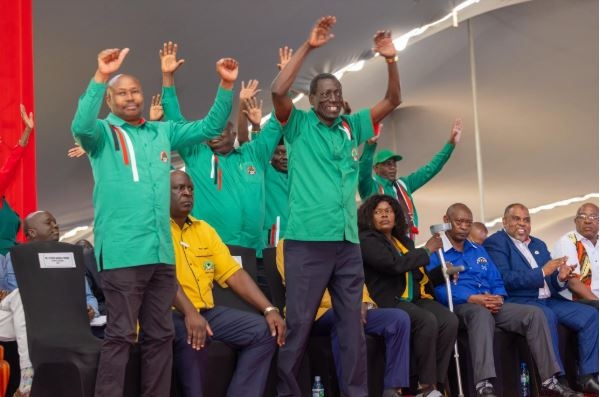I have always had a love affair with the military and military history globally. I am actually quite fascinated by the mere philosophy of someone putting their lives on the line in defence of the sovereignty of a nation. Therefore, some of my greatest heroes of all time remain top military generals and soldiers who fought some of the most famous wars in the world, or those who stood on firm principle here in my home country.
In another lifetime, I might even have joined the military. I made an attempt during one recruitment drive, immediately after high school, many years ago, but the army corporal checking out the fitness status of potential recruits took one look at my legs and loudly wondered, “are these the legs you want to join the military with or can we expect leg reinforcements later in the day?” I never tried again. But I became an avowed military watcher and pseudo-historian,
Predictably, on Saturday last week, I watched the swearing-in of promoted military generals, streaming from State House, Nairobi, after President William Ruto made new appointments within the Kenya Defence Forces top brass. What struck me was the President’s address to the newly appointed generals and the top military bosses, after the swearing-in. It was the most patriotic and sensible speech I had heard Ruto make.
Perhaps the solemn nature of the military occasion contributed to this, or even the evident lack of a reason to be partisan or divisive, but I had to rewind my YouTube feed to be sure it was indeed Ruto sounding so inspirational, for once. And he wasn’t referring to any notes. Maybe he needs to sound more like that and spread the positivity to assure the nation in these difficult times.
Now to the substance of the changes. Kenyan military watchers would not have been surprised at some of the changes. For instance, the promotions of Major Generals David Tarus, Juma Mwinyikai and Jimson Mutai to Three-Star Generals (Lieutenant General) were thoroughly deserved and possibly even overdue. All three are widely respected within the ranks as firm, principled and fair officers and leaders.
One odd thing that stood out, though, was that after being known for decades simply as Jimson Mutai, the new Vice Chancellor of the National Defence University, in all State House and Department of Defence communications, suddenly became just Lt Gen Jimson Longiro, with all references to his promotion stopping at his middle name. Whatever the motivation within the establishment for this, it doesn’t negate the general’s stellar rise to the second-highest rank in Kenya’s military.
That aside, I have been pointing out in these pages that in the last batch of senior military changes last year, Ruto and the Defence Council created a sort of anomaly by appointing two less Three-Star Generals than normal. The command postings of both the National Defence University (NDUK) in Nakuru and the National Defence College (NDC) in Karen, Nairobi, are traditionally Three-Star appointments.
For a year, these two institutions have been led by Maj Gen Said Farah and Maj Gen Rashid Elmi, respectively. In the newly announced promotions, Lt Gen Mutai headed to Nakuru as Vice Chancellor of NDUK while Lt Gen Mwinyikai was posted to NDC, thereby regularising the command structures. However, for this year-old gaffe, the two Two-Star Generals who have been holding fort in these premier military institutions, through no fault of their own, immediately relinquished command to their incoming senior colleagues.
Let us delve into a bit of the politics, because we wouldn’t be real, warm-blooded Kenyans without this. I was reading the memoirs of Defence CS Aden Duale, titled For the Record, an exciting book, to be honest, if you are one invested heavily in Kenyan politics. Among the pictures in the book, one shows [former] President Uhuru Kenyatta celebrating his election victory after the 2017 repeat elections. Standing behind Uhuru in the photo is Aide de Camp Colonel Peter Njiru.
Exactly five years later, just before the 2022 general election, Njiru had accelerated through the ranks to not only become a Three-Star General but also Commander Kenya Army. For context, that is to say he had already been Colonel, Brigadier and Major General in that short period. If there was any feeling within the new Kenya Kwanza regime that he was the quintessential ‘Uhuru General’, it wouldn’t be too off the mark. Indeed, some social media commentators, especially from Uhuru’s Mt Kenya region, briefly lamented the retirement of Lt Gen Njiru over the weekend.
But that was only because they did not care to flip the history pages. The supposed early retirements (if one looks at it that way) of Army Commander Lt Gen Peter Njiru and Vice Chief of Defence Forces Lt Gen Jonah Mwangi last Saturday, eerily mirror the actions of the Mwai Kibaki regime. Soon after the president assumed office in 2003, he quickly moved to retire celebrated Lt Gen Lazaro Sumbeiywo as Army Commander and two years later, Vice Chief of Defence Forces Lt Gen John Koech, now deceased.
In multiparty Kenya, every changing of the guard at State House has come with the desire of the new president to overhaul the top security structure to have his own appointees in crucial positions. However, the methods of the Kibaki people were callous, careless and naïve, a contributing factor to the bitterness that led to the post-election violence of 2007-08. As far as the military is concerned, to his credit, Ruto has been more meticulous and calculating, by avoiding too much drastic action in the first year of his presidency.
But even he must be alive to the fact that in a country where ethnic and political divisions reign supreme, such changes will first be looked at with a tribal eye. On his list of promotions, it was clear that aside from Lt Gen Mwinyikai, every other officer promoted came from one of the two main ‘ruling tribes’ of the Kenya Kwanza regime. If he meant his words at the swearing-in of the new officers, that a stable security apparatus represented a stable country with sustainable peace, he cannot keep playing the same ethnic cards played by his predecessors.
I was thoroughly disappointed reading through the list of new military appointments, when it became apparent that even though the announcement was made on the occasion of International Women’s Day, Ruto hadn’t found a woman officer deserving of promotion to Two-Star General. And it is not as though there was a lack of officers to pick from. For instance, I would have loved to see Ruto tap Brigadier Joyce Sitienei, the Director of the Peace Support Training Centre, for Major General.
We have become accustomed to citing “Tonje Rules” in conversations about the military. We hardly remember, however, that among illustrious General Daudi Tonje’s reforms was the disbandment of the Women’s Service Corps in 1999, the integration of women into regular military units and subsequent empowerment to compete for promotions with male servicemen and officers.
It’s nearly mid-2024 and the KDF still has just one lady Major General – Maj Gen Fatma Ahmed. I can’t find one reason why we don’t have more in the three top ranks of the military, and the Defence Council should ask itself whether it can find any.













